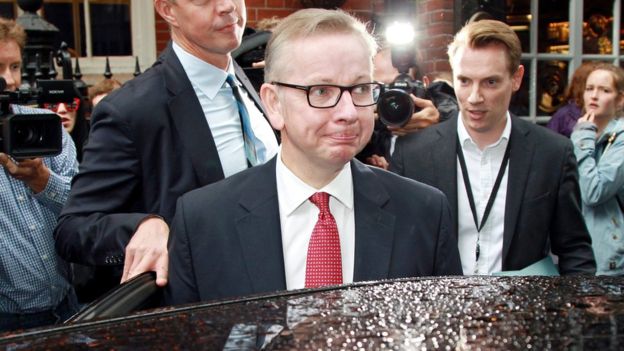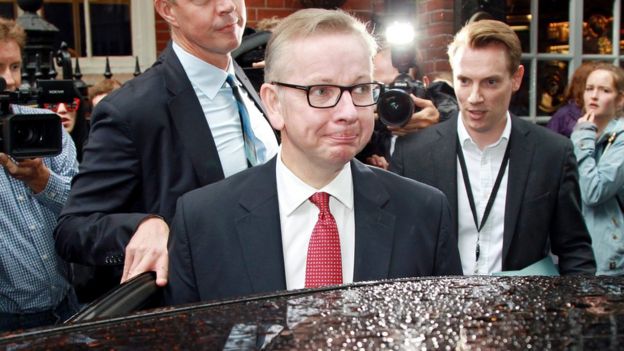

Chancellor George Osborne has abandoned his target to restore authorities price range to a surplusthrough 2020.
In a speech he said, given the consequences of the referendum vote, the government needed to be “sensible about attaining a surplus via the quit of the last decade“.
The target had been the chancellor’s maximum prized purpose and were riding austerity measures inpreceding budgets.
But he stated the economy is displaying “clean signs and symptoms” of surprise following the vote to leave the ecu Union.
Giving a speech in Manchester, Mr Osborne stated: “The referendum is expected to provide a sizeablenegative financial shock to our financial system. How we respond will determine the impact on jobs andboom.
“We have to offer financial credibility, persevering with to be hard at the deficit even as being sensibleapproximately reaching a surplus by means of the quit of the last decade.”
Comply with the trendy trends on our stay page
Tory management: Runners and riders
Laura Kuenssberg: Gove and Johnson – what occurred?
Gove: I need to be PM to alternate usa
Siemens United kingdom warns that Brexit vote could hit funding
Savers and borrowers braced for change
Labour’s shadow chancellor John McDonnell welcomed the pass, saying: “Alas the vote ultimate Thursday for Brexit has handiest introduced forward what was inevitable.
“The Chancellor had already dropped his other financial regulations on welfare and debt on the financesin March, and in step with many economists he was expected to be pressured to drop this one too.”
target ‘shredded’
BBC business editor Kamal Ahmed says that the goal become heading for the “Treasury shredding gadget” following a speech from Home Secretary Theresa May additionally the day gone by.
In a speech launching her bid to end up high minister she said “we should now not are seeking for toattain a price range surplus through the quit of the parliament”.
Kamal says that Mr Osborne has now accompanied suit.
Nonetheless, the Treasury insists that it still desires to stability the books and “restore thefinances“.Lengthy shot
Mr Osborne first dedicated himself to returning the country wide finances to surplus by 2020 at theConservative Party convention in 2013 and it became policy in the July finances of 2015.
However there were questions ever in view that over whether that concentrate on can be met.
Even before the referendum vote he handiest had “a slightly higher than 50/50 hazard” of making thegoal said Carl Emmerson, deputy director of the Institute for fiscal Studies.
However the uncertainty because of the Depart vote should hold returned the economic system and make developing a surplus even more difficult.
“Having voted for Brexit closing week, the economy is honestly going to go into a downswing, that might be a complete-blown recession, that would simply be very very low boom,” stated Paul Johnson the director of the IFS.
Analysis: Kamal Ahmed, BBC economics editor
It’s far from time to time easy in these fantastic political instances to forget that for the majority “it is theeconomic system, silly” nevertheless holds proper.
For the United Kingdom economy, one of the most crucial passages of Theresa Might also‘s speech the day before today became whilst she signalled that George Osborne’s “fiscal rule” (to provide a budgetsurplus with the aid of 2020) was for the Treasury shredding machine.
“while It is without a doubt critical that the authorities maintains with its aim to reduce public spending and reduce the budget deficit, we must now not are searching for to reach a price range surplus with the aid of the quit of the parliament,” Mrs May said.
Now the chancellor has stated he agrees, arguing that the government have to be “sensible“approximately its financial targets and that austerity policies might be eased.
My Treasury resources factor out that the “rule” may be numerous in “non-ordinary” times.
And those are pretty “non-normal” times.
The abandonment of the monetary goal shows the authorities should borrow greater, possibly forinvestment in infrastructure and to mitigate the want for tax rises and spending cuts, if the economy does take a flip for the worse as some expect.
extra from Kamal: Brexit and the easing of austerityPolitical turmoil
The Tories had been in turmoil because David Cameron introduced his aim to renounce following the United Kingdom‘s vote in favour on leaving the european Union.
In a shock development on Thursday, Boris Johnson, extensively seen because the frontrunner to turn out to be prime minister, introduced that he could now not be strolling.
The BBC has learned that Justice Secretary Michael Gove is now coming below developing strain to abandon his bid to turn out to be Tory leader.
assets have advised the BBC government ministers are attempting to persuade the justice secretary to give manner so the Party can “unite” round Home Secretary Theresa Might also.
Mr Gove opted to stand after switching his support from Boris Johnson.
In a speech, Mr Gove stated his decision to face to turn out to be Conservative leader is driven by means of “conviction” about what is proper for the United Kingdom no longer personal ambition.
3 other candidates have put their names forward for the Conservative management: Power Minister Andrea Leadsom, MP Liam Fox and Paintings and Pensions Secretary Stephen Crabb.
‘Austerity for longer’
The government borrowed £seventy four.9bn in the 2015/2016 economic year and for the monetary 12 months up to now – masking April and can – borrowing reached £17.9bn, £zero.2bn higher than the sameperiod a 12 months ago.
It is thought that the government will now raise borrowing, so it may avoid in addition cuts in spending orelevating taxes. It could also borrow to put money into large constructing tasks.
“The problem of path is, you can not borrow forever,”stated Paul Johnson from the IFS.
“So we’ll have some more years of extra borrowing, But my wager is this is not the give up of austerity,absolutely this means austerity will simply pass on for longer due to the fact we will in all likelihoodhave the spending cuts and tax rises right thru the 2020s to pay for this.”
In a speech he said, given the consequences of the referendum vote, the government needed to be “sensible about attaining a surplus via the quit of the last decade“.
The target had been the chancellor’s maximum prized purpose and were riding austerity measures inpreceding budgets.
But he stated the economy is displaying “clean signs and symptoms” of surprise following the vote to leave the ecu Union.
Giving a speech in Manchester, Mr Osborne stated: “The referendum is expected to provide a sizeablenegative financial shock to our financial system. How we respond will determine the impact on jobs andboom.
“We have to offer financial credibility, persevering with to be hard at the deficit even as being sensibleapproximately reaching a surplus by means of the quit of the last decade.”
Comply with the trendy trends on our stay page
Tory management: Runners and riders
Laura Kuenssberg: Gove and Johnson – what occurred?
Gove: I need to be PM to alternate usa
Siemens United kingdom warns that Brexit vote could hit funding
Savers and borrowers braced for change
Labour’s shadow chancellor John McDonnell welcomed the pass, saying: “Alas the vote ultimate Thursday for Brexit has handiest introduced forward what was inevitable.
“The Chancellor had already dropped his other financial regulations on welfare and debt on the financesin March, and in step with many economists he was expected to be pressured to drop this one too.”
target ‘shredded’
BBC business editor Kamal Ahmed says that the goal become heading for the “Treasury shredding gadget” following a speech from Home Secretary Theresa May additionally the day gone by.
In a speech launching her bid to end up high minister she said “we should now not are seeking for toattain a price range surplus through the quit of the parliament”.
Kamal says that Mr Osborne has now accompanied suit.
Nonetheless, the Treasury insists that it still desires to stability the books and “restore thefinances“.Lengthy shot
Mr Osborne first dedicated himself to returning the country wide finances to surplus by 2020 at theConservative Party convention in 2013 and it became policy in the July finances of 2015.
However there were questions ever in view that over whether that concentrate on can be met.
Even before the referendum vote he handiest had “a slightly higher than 50/50 hazard” of making thegoal said Carl Emmerson, deputy director of the Institute for fiscal Studies.
However the uncertainty because of the Depart vote should hold returned the economic system and make developing a surplus even more difficult.
“Having voted for Brexit closing week, the economy is honestly going to go into a downswing, that might be a complete-blown recession, that would simply be very very low boom,” stated Paul Johnson the director of the IFS.
Analysis: Kamal Ahmed, BBC economics editor
It’s far from time to time easy in these fantastic political instances to forget that for the majority “it is theeconomic system, silly” nevertheless holds proper.
For the United Kingdom economy, one of the most crucial passages of Theresa Might also‘s speech the day before today became whilst she signalled that George Osborne’s “fiscal rule” (to provide a budgetsurplus with the aid of 2020) was for the Treasury shredding machine.
“while It is without a doubt critical that the authorities maintains with its aim to reduce public spending and reduce the budget deficit, we must now not are searching for to reach a price range surplus with the aid of the quit of the parliament,” Mrs May said.
Now the chancellor has stated he agrees, arguing that the government have to be “sensible“approximately its financial targets and that austerity policies might be eased.
My Treasury resources factor out that the “rule” may be numerous in “non-ordinary” times.
And those are pretty “non-normal” times.
The abandonment of the monetary goal shows the authorities should borrow greater, possibly forinvestment in infrastructure and to mitigate the want for tax rises and spending cuts, if the economy does take a flip for the worse as some expect.
extra from Kamal: Brexit and the easing of austerityPolitical turmoil
The Tories had been in turmoil because David Cameron introduced his aim to renounce following the United Kingdom‘s vote in favour on leaving the european Union.
In a shock development on Thursday, Boris Johnson, extensively seen because the frontrunner to turn out to be prime minister, introduced that he could now not be strolling.
The BBC has learned that Justice Secretary Michael Gove is now coming below developing strain to abandon his bid to turn out to be Tory leader.
assets have advised the BBC government ministers are attempting to persuade the justice secretary to give manner so the Party can “unite” round Home Secretary Theresa Might also.
Mr Gove opted to stand after switching his support from Boris Johnson.
In a speech, Mr Gove stated his decision to face to turn out to be Conservative leader is driven by means of “conviction” about what is proper for the United Kingdom no longer personal ambition.
3 other candidates have put their names forward for the Conservative management: Power Minister Andrea Leadsom, MP Liam Fox and Paintings and Pensions Secretary Stephen Crabb.
‘Austerity for longer’
The government borrowed £seventy four.9bn in the 2015/2016 economic year and for the monetary 12 months up to now – masking April and can – borrowing reached £17.9bn, £zero.2bn higher than the sameperiod a 12 months ago.
It is thought that the government will now raise borrowing, so it may avoid in addition cuts in spending orelevating taxes. It could also borrow to put money into large constructing tasks.
“The problem of path is, you can not borrow forever,”stated Paul Johnson from the IFS.
“So we’ll have some more years of extra borrowing, But my wager is this is not the give up of austerity,absolutely this means austerity will simply pass on for longer due to the fact we will in all likelihoodhave the spending cuts and tax rises right thru the 2020s to pay for this.”





